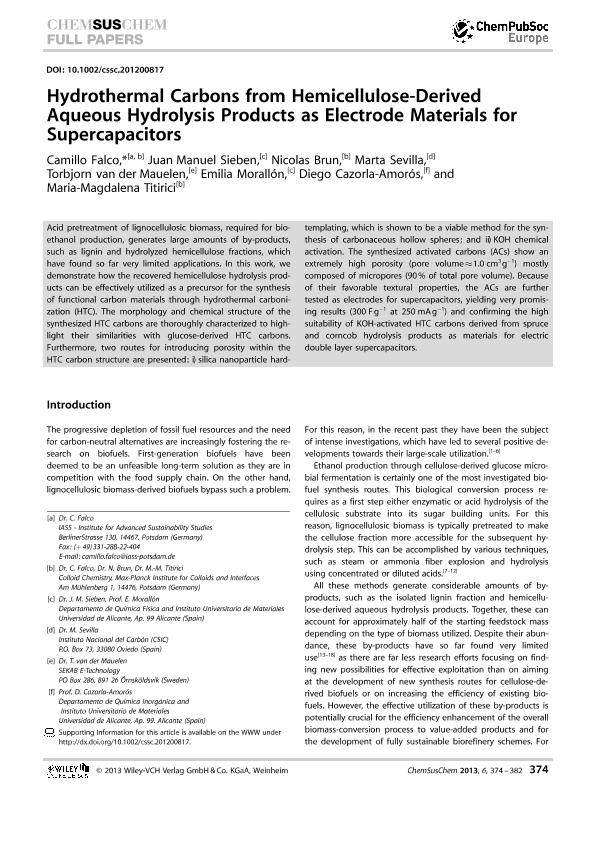Mostrar el registro sencillo del ítem
dc.contributor.author
Falco, Camillo
dc.contributor.author
Sieben, Juan Manuel

dc.contributor.author
Brun, Nicolas
dc.contributor.author
Sevilla, Marta
dc.contributor.author
van der Mauelen, Torbjorn
dc.contributor.author
Morallón, Emilia
dc.contributor.author
Cazorla Amorós, Diego
dc.contributor.author
Titirici, Maria Magdalena
dc.date.available
2017-02-03T18:23:43Z
dc.date.issued
2013-02
dc.identifier.citation
Falco, Camillo ; Sieben, Juan Manuel; Brun, Nicolas ; Sevilla, Marta ; van der Mauelen, Torbjorn ; et al.; Hydrothermal Carbons from Hemicellulose-Derived Aqueous Hydrolysis Products as Electrode Materials for Supercapacitors; Wiley VCH Verlag; Chemsuschem; 6; 2; 2-2013; 374-382
dc.identifier.issn
1864-5631
dc.identifier.uri
http://hdl.handle.net/11336/12448
dc.description.abstract
Acid pretreatment of lignocellulosic biomass, required for bioethanol production, generates large amounts of by-products, such as lignin and hydrolyzed hemicellulose fractions, which have found so far very limited applications. In this work, we demonstrate how the recovered hemicellulose hydrolysis products can be effectively utilized as a precursor for the synthesis of functional carbon materials through hydrothermal carbonization (HTC). The morphology and chemical structure of the synthesized HTC carbons are thoroughly characterized to highlight their similarities with glucose-derived HTC carbons. Furthermore, two routes for introducing porosity within the HTC carbon structure are presented: i) silica nanoparticle hard-templating, which is shown to be a viable method for the synthesis of carbonaceous hollow spheres; and ii) KOH chemical activation. The synthesized activated carbons (ACs) show an extremely high porosity (pore volume≈1.0 cm3 g−1) mostly composed of micropores (90 % of total pore volume). Because of their favorable textural properties, the ACs are further tested as electrodes for supercapacitors, yielding very promising results (300 F g−1 at 250 mA g−1) and confirming the high suitability of KOH-activated HTC carbons derived from spruce and corncob hydrolysis products as materials for electric double layer supercapacitors.
dc.format
application/pdf
dc.language.iso
eng
dc.publisher
Wiley VCH Verlag

dc.rights
info:eu-repo/semantics/openAccess
dc.rights.uri
https://creativecommons.org/licenses/by-nc-sa/2.5/ar/
dc.subject
Biomass
dc.subject
Carbon
dc.subject
Green Chemistry
dc.subject
Microporous Materials
dc.subject
Supercapacitors
dc.subject.classification
Físico-Química, Ciencia de los Polímeros, Electroquímica

dc.subject.classification
Ciencias Químicas

dc.subject.classification
CIENCIAS NATURALES Y EXACTAS

dc.title
Hydrothermal Carbons from Hemicellulose-Derived Aqueous Hydrolysis Products as Electrode Materials for Supercapacitors
dc.type
info:eu-repo/semantics/article
dc.type
info:ar-repo/semantics/artículo
dc.type
info:eu-repo/semantics/publishedVersion
dc.date.updated
2017-02-02T14:06:30Z
dc.identifier.eissn
1864-564X
dc.journal.volume
6
dc.journal.number
2
dc.journal.pagination
374-382
dc.journal.pais
Alemania

dc.journal.ciudad
Weinheim
dc.description.fil
Fil: Falco, Camillo . Institute for Advanced Sustainability Studies; Alemania. Max Planck Institute for Colloids and Interfaces. Colloid Chemistry; Alemania
dc.description.fil
Fil: Sieben, Juan Manuel. Universidad Nacional del Sur. Departamento de Ingenieria Quimica. Instituto Ing.electroquimica y Corrosion; Argentina. Universidad de Alicante; España. Consejo Nacional de Investigaciones Científicas y Técnicas; Argentina
dc.description.fil
Fil: Brun, Nicolas . Max Planck Institute for Colloids and Interfaces. Colloid Chemistry; Alemania
dc.description.fil
Fil: Sevilla, Marta . Consejo Superior de Investigaciones Cientificas; España
dc.description.fil
Fil: van der Mauelen, Torbjorn . Swedish Ethanol Chemistry AB E-Technology; Suecia
dc.description.fil
Fil: Morallón, Emilia . Universidad de Alicante; España
dc.description.fil
Fil: Cazorla Amorós, Diego . Universidad de Alicante; España
dc.description.fil
Fil: Titirici, Maria Magdalena . Max Planck Institute for Colloids and Interfaces. Colloid Chemistry; Alemania
dc.journal.title
Chemsuschem

dc.relation.alternativeid
info:eu-repo/semantics/altIdentifier/url/http://onlinelibrary.wiley.com/doi/10.1002/cssc.201200817/abstract
dc.relation.alternativeid
info:eu-repo/semantics/altIdentifier/doi/http://dx.doi.org/10.1002/cssc.201200817
Archivos asociados
